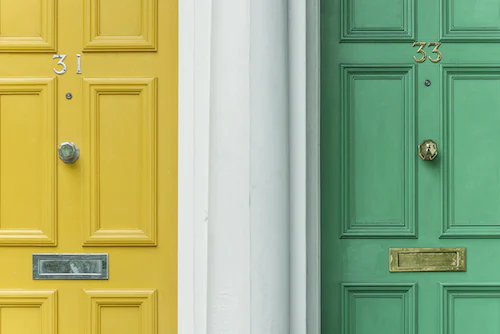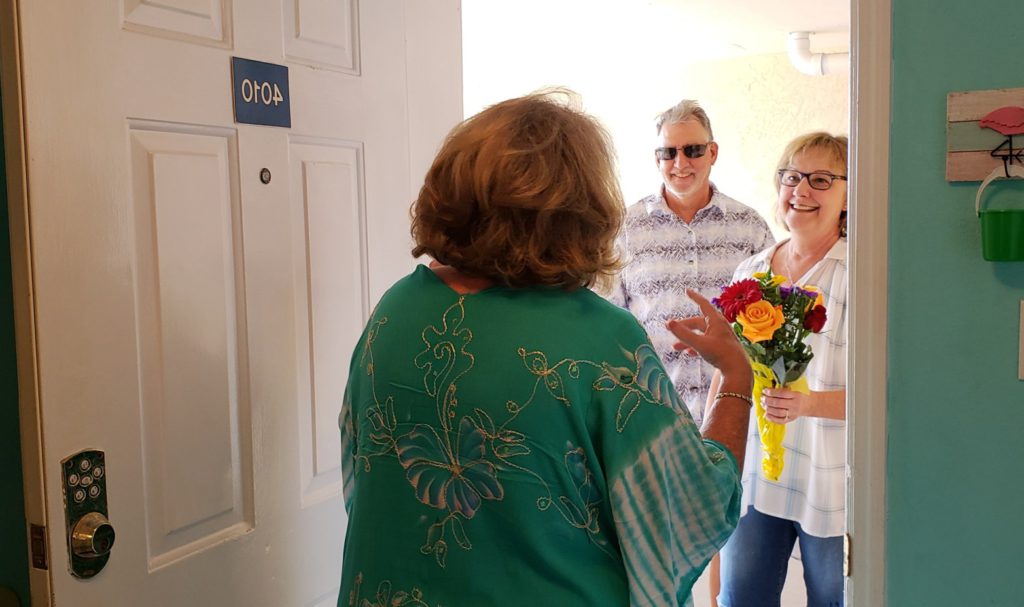This website uses cookies so that we can provide you with the best user experience possible. Cookie information is stored in your browser and performs functions such as recognising you when you return to our website and helping our team to understand which sections of the website you find most interesting and useful.
9 Ways to Improve Your Vacation Rental Neighborhood Relationships

Your vacation rental home might be getting great reviews from guests and making a tidy profit. But if your property is in a residential area that isn’t specifically aimed at tourists, you risk alienating your neighbors. You might even attract the attention of the local authorities and face a ban on your vacation rental property.
Your best strategy is to get your local community on your side and build great vacation rental neighbor relationships. If you’re proactive in communicating with your neighbors, you’ll be more likely to achieve a peaceful solution should problems arise.
In this article, we’ve put together a list of 9 strategies you can use to build and maintain good relationships with your neighbors. We’ll look at:
- Establishing and maintaining communication
- How house rules can reduce problems
- Guest verification
- Noise monitoring strategies and tools
- Parking and trash management
Let’s begin by looking at the strategies you can use to build trust and rapport with your neighbors.
Avoid Risky Renters with Safely’s Guest Verification
How to build good relationships with vacation rental neighbors
Creating and maintaining a good relationship with your neighbors will reduce complaints and create a welcoming environment for your guests.
With a few simple steps, you can lay the foundations for a warm and long-lasting relationship that will ensure any issues that arise are resolved in an amicable and considerate way.
1. Communicate and show you care
One way or another, your neighbors are going to find out about your vacation rental, but how they hear about it will affect their reaction. The last thing you want is for your neighbors to realize they’re living next to a vacation rental when they notice a group of strangers in your backyard.
Tell your neighbors about your plans before you list your property on a booking platform. Take them a bottle of wine or a gift basket and try to put their minds at ease by showing you’ve given careful thought to how you’re going to manage your rental. For example:
- Assure them you’ve got all the necessary permits from the city council or homeowner association (HOA)
- Tell them you plan to verify your guests
- Explain how you’ll market the property and the types of guests you aim to attract
- Tell them about the house rules you’ll set to ensure guests are respectful of your residential neighborhood.
- Give your neighbors your contact information and a direct line for emergencies, and make sure you answer their call immediately.

2. Find out what problems they’ve had in the past
Ask your neighbors about their past problems with Airbnbs or other short-term rental properties in the neighborhood. If your neighbors are opposed to the idea of living next door to a vacation rental, it’s possible they’ve had a bad experience in the past
Listen to their concerns and explain what plans you have in place to address them. So if your neighbors tell you they once lived next door to a short-term rental where guests arrived in the middle of the night and woke them up, you can assure them that you’re only going to allow check-in during the day, or even at weekends.
Ultimately, you want your neighbors to feel they’ve had the chance to air their concerns and that you’ve listened to them.
3. Set clear house rules
Setting house rules so your guests know what you expect from them will encourage good behavior. You can set out your house rules in the listing itself, and add them to your confirmation email and other correspondence.
Getting the tone right is important. You want to be firm, but not be so draconian that you risk alienating your guests before they even arrive.
In particular, you should set clear rules on issues that might disrupt neighborhood relationships like parking, check-in and check-out times, excessive noise, use of communal areas, and how many people can be in the property at once.
4. Verify your guests
The biggest source of problems for vacation rental neighbor relationships is the guests themselves. No one minds when a delightful, quiet couple stays for a few days and adds to the overall charm of a residential neighborhood. It’s when their inconsiderate friends come for a late-night party that things turn sour.
You can evaluate guests yourself by checking out their profiles on Airbnb or whichever booking platform you’re using to see what other hosts have said about them. Unfortunately, this isn’t a foolproof system as it’s easy to create a new guest profile if you get a bad review and want to hide the evidence.
Also, if you reject guests for personal reasons, they might be offended that you’re discriminating against them and lodge a complaint. You could even lose your Superhost status on Airbnb if you cancel bookings for no reason.
Using Safely’s automated guest verification is a more objective and more dependable way to verify your guests. It uses ID verification to check your guests are who they say they are and scours international sanctions and watchlists to make sure you won’t be unknowingly renting to sanctioned individuals. Plus, Safely’s use of regulatory protocols means you’re protected legally if you cancel a booking as a result of Safely’s findings.
Key features of Safely guest verification:
- PMS integration. You can set up guest verification to automatically sync with your property management system
- Seamless process for guests. Visitors just need to provide their name, birth date, and address during booking and won’t feel like you’re asking them too many questions.
- Objectivity. Safely returns fact based information you can use to make informed and objective decisions.
- Protection for your property. Your property is less likely to be damaged if you verify your guests.
5. Encourage them to reach out
Encourage your neighbors to keep in touch and respond quickly to their concerns. To get your communication with neighbors off to a good start, you can send your neighbors a quick message to let them know when guests are arriving and follow up afterward to make sure everything was fine.
As well as letting them know about guest arrivals, you can keep communication channels open in other ways. If you’ve set up a guidebook to the area, you can share it with them and ask if they have other recommendations for restaurants or local attractions.
Also if you have a regular gardener or housekeeper who works for you, you can ask your neighbors if they’d be interested in employing them too. You might be able to negotiate a discounted rate, and your neighbors will appreciate the fact you’re organizing a useful service for them.
6. Install noise monitoring hardware
Most complaints from neighbors about a short-term rental relate to noise. To reduce the chance of a party taking place that upsets your neighbors, create a noise reduction action plan that includes:
- Clear guidelines for guests on quiet hours
- Consequences for guests that violate your house rules about noise ordinances
- A limit on the number of guests who can stay
- Setting a minimum age for guests of 25 years or older
- Banning parties
You can also a WiFi connection monitoring tool like Party Squasher that alerts you if there are too many people inside one of your properties, based on your custom-set occupancy limit.

7. Offer a discount stay
It’s possible that your neighbors will end up being some of your best customers. You can offer your property at a discounted rate for when their friends and family come to stay.
This can help them maintain household harmony when guests come to stay as they won’t need to ask their warring teenagers to share a room, or make their in-laws sleep on a sofa bed. At the same time, it will help your neighbors view your short-term rental as an asset rather than a nuisance.
8. Designate parking spaces
If parking is at a premium in your area, your neighbors won’t be very happy if your guests take the few available parking spots. Consider paying for a nearby car park if your property is in a city or town center with limited parking. Or you can suggest a place where your guests can safely leave their car and get public transportation to your property.
If you have a suburban house, you should ensure there’s enough parking for your guests’ vehicles. Even if you have a garage or a driveway, your guests will likely have two or three cars between them and need extra parking.
Find out what the rules are for parking on your street and tell your guests they can’t park in front of your neighbor’s driveways, or block trash cans or mailboxes. You can use street-facing security cameras to check that your guests are following the rules.

9. Trash management plan
Every residential neighborhood has its own rules and regulations about which days to take out the trash, where to leave it, and which items can be recycled.
If you provide your guests with detailed instructions on what to do, there’s a good chance they’ll respect the house rules. But it’s worth having a backup plan in case sorting and taking out the trash isn’t high on your guests’ list of priorities for their stay. This can involve:
- Sending a friendly reminder to guests to take on the trash on collection day
- Asking a neighbor to alert you if they spot any trash piled up outside your property
- Asking your housekeeper to keep an eye on the property during a stay and dispose of any trash left outside
The key to great relationships with neighbors
Strained relationships with neighbors can cause sleepless nights for everyone concerned and leave your guests feeling uncomfortable and unwelcome in your rental home.
By making it a priority to establish trust and rapport with your neighbors, you can reduce the risk of complaints and find a quick and amicable solution when problems do arise.
The best way to build a good relationship with your neighbors is to be open and honest about your plans for your rental property and listen to their concerns. You can also offer them discounts for their friends and family and do them favors like sending your gardener around to help maintain their lawn.
Better yet, you can reduce the chance of having noisy and inconsiderate guests by:
- Verifying renters
- Setting clear house rules about parking and trash disposal
- Using noise monitoring tools to keep a check on potential parties
With Safely’s guest verification, you’ll be able to make an informed decision about who can stay in your home without upsetting your neighbors.
They might even start to love your vacation rental home as much as you do.
Avoid Risky Renters with Safely’s Guest Verification
Related Resources






